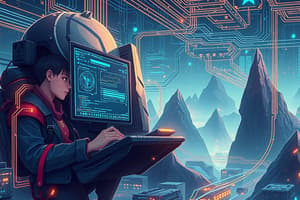Podcast
Questions and Answers
Cò às a bheil CamScanner air a dhèanamh?
Cò às a bheil CamScanner air a dhèanamh?
- Aonad eadar-lìn
- Eaglais
- Fòn smart (correct)
- Banca dhibh, air an spraidheas
Dè an seòrsa obrach a leigeas CamScanner le luchd-cleachdaidh a dhèanamh?
Dè an seòrsa obrach a leigeas CamScanner le luchd-cleachdaidh a dhèanamh?
- Ceòl a chluich
- Clàr a chruthachadh
- Dealbhan a ràdh
- Sgrìobhainnean a scanadh (correct)
Dè a tha na feartan sònraichte aig CamScanner?
Dè a tha na feartan sònraichte aig CamScanner?
- Fhad a' cluich
- Pip a thoirt a-steach
- Cuir a-mach an fhaidhle PDF (correct)
- Scannadh neo-phàirteach
Cò na daoine a bhios gu freagairteach comasach air CamScanner a chleachdadh?
Cò na daoine a bhios gu freagairteach comasach air CamScanner a chleachdadh?
Càite am faigh sinn CamScanner?
Càite am faigh sinn CamScanner?
Flashcards
CamScanner
CamScanner
An app airson dealbhan a ghabhail agus a chur a-steach.
Làrach-lìn
Làrach-lìn
Àite air an eadar-lìon.
App
App
Prògram airson inneal-làimhe a chleachdadh.
Dealbhan
Dealbhan
Signup and view all the flashcards
Sgrìobhadh sìos
Sgrìobhadh sìos
Signup and view all the flashcards
Study Notes
### Software
- Programs that run on a computer are called software.
- Instructions carried out by the computer's processor.
- Some computers can only run one program at a time, others can run multiple programs simultaneously.
- Some computers are single-purpose; others are general-purpose.
- Two basic groups of software: system software and application software.
System Software
- Designed to maintain or operate the computer system.
- Utility software is one form of system software; it carries out configuration and maintenance tasks.
- Backup utilities create file and program copies; can be set to run automatically or manually.
Learning Objectives
- Identify the purpose of system software and applications software.
- Discuss operating systems and system software such as utilities.
- Understand the operating system's role, including single user/network, memory & resource management and security.
- Discuss software applications, including office productivity tools, web authoring and image/sound/presentation software, and project management software.
- Know about software licensing-types (free/open source, proprietary).
- Understand the purpose of communication software, which provides remote access to systems and exchanges files/messages.
- Understand software updates, configuration and data/system risks.
- Identify how ICT systems can be configured to meet accessibility needs.
- Justify choices made when identifying and configuring hardware/software.
Defragmentation
- Data stored on hard disk might be fragmented (out of order).
- Defragmentation utilities reorder data to be stored closer together.
- Defragmentation utilities are usually set to run automatically.
Operating Systems
- Allow users to control and manage a computer's hardware.
- Single user operating systems do not allow users to customise the user interfaces for different users.
- Network operating systems have additional functions, such as separating user accounts and access to resources.
- Memory management: the operating system allocates memory to applications.
- Memory management also handles virtual memory.
Compression
- Compression utilities reduce the size of files/sets of files by storing repeated data patterns only once.
- Compression utilities cannot be used to read the original compressed file without first decompressing it.
Formatting
- Formatting prepares storage media for first use.
- Formatting erases all data on a storage device making it unreadable by applications.
- Formatting can make a disk compatible with all operating systems- depending on the parameters selected by the user.
Resource Management
- System resources, including components (like the processor and graphics card), and external devices (like printers), are managed by the operating system.
- The operating system manages resources available for applications.
- If a resource is already being used by another application, it can place the request into a queue.
- The operating system can tell the user when a resource, like a printer, becomes available.
- Security: Operating systems use usernames/passwords,biometric scanning or personal access cards for user access and authorising/preventing network data from remotely accessing a service.
Print Spooling
- During large print jobs, pages are kept in a queue and printed faster than the printer can print them.
- This process is called Print Spooling.
### Office Productivity Software
- Includes applications that address work-related tasks.
- Often available as an application suite.
- Word Processing Software: creates documents including text, images, tables, hyperlinks, equations, drawings, and charts.
- Software that can be used for letters, reports, essays and books..
Web Authoring
- Software that allows users to create web pages, containing text and images.
- HTML is used for the structure/layout of web pages, and is read by web browser software (e.g., Chrome, Edge or Firefox).
- Web pages can be linked together to create websites for viewing on intranets or internet servers.
Image Editing
- Software for creating and editing bitmap images (photos) or vector graphics such as drawings.
- Editing features: vectorizing, layers, adding text, shapes and lines, and altering colors/fills.
Graphic Editors
- Software that allows users to create and edit vector graphics.
- Examples of features: vectorizing images, layers, adding text, adding/drawing shapes, resizing/aligning/moving shapes/lines, and altering colors.
Photo Editors
- Software that is used to edit photos.
- Examples of features: adjusting brightness/contrast; resizing images; altering sharpness and blurring; applying filters and effects such as distortion, red-eye removal and cropping.
Sound Editing
- Software used to edit audio files and combine them to create multimedia content (like soundtracks for videos).
- Features: cut, join audio clips; silence/solo audio tracks; alter/change volume; alter tempo.
Presentation Software
- Creates multimedia content, such as images, text, animation and video.
- Used for slides or pathways to illustrate/support spoken content or talks given to an audience.
Control Applications
- Software used to automate actions in a physical environment.
- Used for tasks like controlling the movement, of control devices or actuators, such as motors.
Remote Control
- Software for controlling devices remotely via the internet.
Internet of Things
- Objects in homes, such as appliances, can be connected to the internet to be controlled remotely.
Project Management
- Software used to plan and track tasks in a project.
- Project managers can monitor timelines and milestones, allocate tasks, assign team members to more than one task, manage costs and schedules, among other functions.
Communication Software
- Provides remote access to systems and allows for contact using the internet.
- Types of communication software: SMS, MMS, Instant Messaging, emails, web browsers and social media apps.
- Software can be used to send files, messages, text, images, audio, and video.
### Software Licensing
- Licenses are legal agreements that give the right to install and use software.
- Two types of software licensing: free/open-source and proprietary.
- Free/open-source software is distributed/modified by users with source code made available.
- Proprietary software is marketed by its owners under a brand name. Often paid.
- Piracy: using software without a license.
Software Updates
- Software developers release updates to fix security vulnerabilities (bugs), improve compatibility, performance, features and usability.
- Users should back-up their system/files before updating software.
Memory and Processors
- Memory: stores instructions for the processor to execute.
- RAM(Random Access Memory): faster than secondary storage; used to store instructions for the processor to quickly retrieve to process. Volatile; data lost when the power is off.
- ROM(Read Only Memory): non-volatile; data permanently stored; used to boot up/load operating systems from secondary storage. Cannot be changed or altered.
- Flash Memory: Type of EEPROM (Electrically Erasable Programmable Read-Only Memory).
- Processors (CPUs): carry out software instructions. Multi-core Processors (multiple CPUs) can work faster.
- Clock Cycles per Second (Hz/kHz/MHz/GHz), measure the speed of a processor.
Studying That Suits You
Use AI to generate personalized quizzes and flashcards to suit your learning preferences.




